Democrats' American Rescue Plan will jazz the economy by putting $2 trillion into the hands of peasants.
The rich aren't used to such unfair treatment. Pish posh.
What's it mean?
Reaganomics is dead. Keynes again reigns.
Keynes claimed spending—by households, businesses, and the government—is the driver of the economy. That's spending, not siphoning, accumulating, banking, or hoarding. When households and businesses don't spend, government must.
Prepare for the brainless lackeys of the rich—the GOP—to begin recycling their three foundational cracker-barrel wisdoms:
- The government is a family. Families must not deficit-spend. Just think what would have happened had June spent more than Ward's salary. Wally and the Beaver would have lived their entire adult lives in poverty. (Don't bring up the fact that the Cleavers couldn't print money, set interest rates, or levy taxes.)
- Government only builds "bridges to nowhere." All government spending is wasteful. (Don't you dare mention the national highway system, space exploration, or the Internet. They were fake news!)
- Peasants are your moral inferiors. The rich shoulder the weight of the whole world, while peasants just loot from them. Handouts will only incent the latter to laze all day, sipping wine, texting, and birthing more brown babies. (Don't remind us the Kardashians do those things, too.)
Don't listen to the GOP's stale and quite stupid malarkey.
Celebrate, instead, the triumphant return from exile of John Maynard Keynes.









